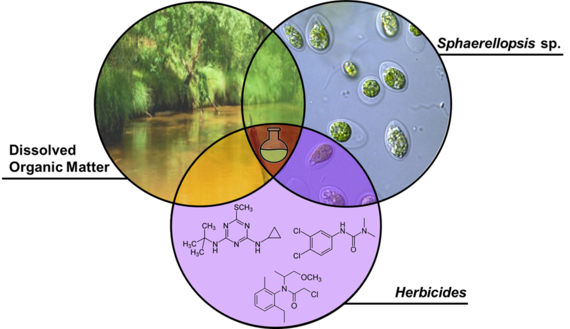IMPACT (2013-2016)
Influence of the quality of dissolved organic matter on the toxicity of pesticides towards microalgae along a freshwater – marine water continuum
Ifremer Coordination | Type of project | Financing | Project duration | Link |
S. Stachowski-Haberkorn (LEX) | National | LabEx COTE Bordeaux | 2013-2016 |
As part of the IMPACT project (Influence of the quality of dissolved organic matter (DOM) on the toxicity of pesticides towards microalgae along a freshwater – marine water ConTinuum), the LabEX COTE has funded the thesis of Nathalie Coquillé (2013-2017, Irstea/Epoc-LPTC/Ifremer thesis). This thesis consisted in evaluating, during laboratory experiments, the toxicity of three herbicides (irgarol, diuron and S-metolachlor), alone and in mixture, on four species of microalgae (two freshwater species and two marine species, in monospecific cultures) with or without the presence of natural dissolved organic matter (DOM). During the experiments, the effects of DOM and herbicides on microalgae physiology were evaluated (growth, relative lipid content, photosynthesis efficiency). At the same time, a characterization of their chemical environment was carried out via: the quantification of the concentrations of exposure to herbicides, the search for their metabolites and the characterization of the temporal evolution of the DOM added and naturally secreted in the cultures.
The work carried out revealed three phenomena:
- the growth of all four species was stimulated to varying degrees in the presence of natural DOM. This stimulation, associated with a modification (proportions of humic and protein substances) of the DOM present in the cultures, suggests a capacity of the microalgae to use, directly or indirectly via the presence of bacteria, organic molecules resulting from a complex mixture present in the natural environment as a source of energy. In particular, the microalga Sphaerellopsis sp. has a strong potential for mixotrophy and seems to require such compounds in its environment to develop optimally. DOM could therefore contribute, in a non-negligible way, to the factors modulating the development of microalgal communities in the environment.
- In the absence of natural DOM, significant toxic effects have been demonstrated on the two species of marine microalgae exposed to irgarol at 0.5 µg/L and to the mixture (irgarol 0.5 µg/L, diuron 0.5 µg/L and S- metolachlor 5 µg/L). The addition of natural DOM in the cultures led to a modulation of the toxic effects measured, which differed according to the species considered. While the effects were attenuated in the diatom C. calcitrans, they were amplified in T. suecica. These results thus illustrate the influence that natural DOM can have on the toxic effects of pesticides encountered in the environment (Coquillé et al., 2018).
- Finally, during exposure to diuron (0.5 µg/L), alone or in a mixture, and in the presence of DOM, the metabolite DCPMU was quantified at 100 ng/L at the end of the experiment and this only in the cultures of the microalga Sphaerellopsis sp. These results suggest a metabolization of diuron by the microalgae and/or the bacteria present naturally in the culture, which occurred only in the presence of DOM (hypothesis of cometabolic degradation via the potential use of carbon and/or organic nitrogen) (Morin et al., 2021).
Ifremer Staff | Academic partners |
Labo LEX : N. Coquillé, D. Ménard, L. Haugarreau | IRSTEA Bordeaux, LPTC Bordeaux |
Main results:
Coquille Nathalie, Menard Dominique, Rouxel Julien, Dupraz Valentin, Eon Melissa, Pardon Patrick, Budzinski Helene, Morin Soizic, Parlanti Edith, Stachowski-Haberkorn Sabine (2018). The influence of natural dissolved organic matter on herbicide toxicity to marine microalgae is species-dependent. Aquatic Toxicology, 198, 103-117. Publisher's official version : https://doi.org/10.1016/j.aquatox.2018.02.019, Open Access version : https://archimer.ifremer.fr/doc/00428/53964/
Morin, S., Coquillé, N., Éon, M., Budzinski, H., Parlanti, É., Stachowski-Haberkorn, S., 2021. Dissolved organic matter modulates the impact of herbicides on a freshwater alga: a laboratory study of a three-way interaction. Science of The Total Environment, 782, 146881.


